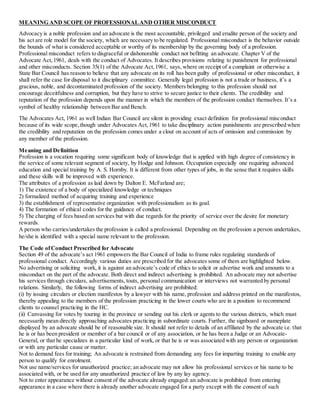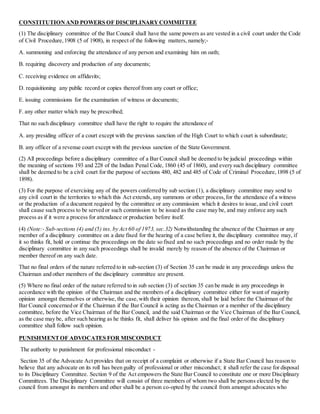The document discusses the meaning and scope of professional misconduct by advocates in India. It begins by stating that advocacy is a noble profession that must be regulated. Professional misconduct refers to unacceptable or dishonorable conduct by an advocate. The Advocates Act of 1961 describes provisions for punishing professional and other misconduct. The State Bar Council has powers to investigate complaints and refer cases to disciplinary committees, which can reprimand, suspend, or remove advocates from the roll. The document then discusses the code of conduct and duties prescribed for advocates, as well as examples of professional misconduct. It outlines the constitution and powers of disciplinary committees to conduct hearings and issue punishments.




![disciplinary committee in any such proceedings shall be invalid merely by reason of the absence of the Chairman or
member thereof on any such date.
That no final orders of the nature referred to in sub-section (3) of Section 35 can be made in any proceedings unless the
Chairman and other members of the disciplinary committee are present.
(5) Where no final order of the nature referred to in sub section (3) of section 35 can be made in any proceedings in
accordance with the opinion of the Chairman and the members of a disciplinary committee either for want of majority
opinion amongst themselves or otherwise, the case,with their opinion thereon, shall be laid before the Chairman of the
Bar Council concerned or if the Chairman if the Bar Council is acting as the Chairman or a member of the disciplinary
committee, before the Vice Chairman of the Bar Council, and the said Chairman or the Vice Chairman of the Bar Council,
as the case may be, after such hearing as he thinks fit, shall deliver his opinion and the final order of the disciplinary
committee shall follow such opinion.
DISPOSAL OF DISCIPLINARYPROCEEDINGS
(1) The disciplinary committee of a State Bar Council shall dispose of the complaint received by it under Section 35
expeditiously and in each cash the proceedings shall be concluded within a period of one year from the date of the receipt
of the complaint or the date of initiation of the proceedings at the instance of the State Bar Council, as the case may be,
failing which such proceedings shall stand transferred to the Bar Council of India which may depose of the same as if it
were a proceeding withdrawn for inquiry under sub section (2) of section 36.
(2) Notwithstanding anything contained in sub section (1) where on the commencement of the Advocates (Amendment)
Act, 1973, any proceedings in respect of any disciplinary matter against an advocate is pending before the disciplinary
committee of a State Bar Council, that disciplinary committee of the State Bar Council shall dispose of the same within a
period of six months from the date of such complaint, or, as the case may be, the date of initiation of the proceedings at
the instance of the State Bar Council, whichever is later, failing which such other proceeding shall stand transferred to the
Bar Council of India for disposal under sub-section.
APPEAL TO THE BAR COUNCIL OF INDIA.
(1) Any person aggrieved by an order of the disciplinary committee of a State Bar Council made [under section 35] [or the
Advocate General of the
State] may, within sixty days of the date of the communication of the order to him, prefer an appeal to the Bar Council of
India. (2) Every such appealshall be heard by the disciplinary committee of the Bar Council of India which may pass such
order [(including an order varying the punishment awarded by the disciplinary committee of the State Bar Council)]
thereon as it deems fit: [Provided that no order of the disciplinary committee of the State Bar Council shall be varied by
the disciplinary committee of the Bar Council of India so as to prejudicially affect the person aggrieved without giving
him reasonable opportunity of being heard.]
APPEAL TO THE SUPREMECOURT
Any person aggrieved by an order made by the disciplinary committee of the Bar Council of India under section 36 or
section 37 [or the Attorney-General of India or the Advocate-General of the State concerned, as the case may be,] may
within sixty days of the date on which the order is communicated to him, prefer an appeal to the Supreme Court and the
Supreme Court may pass such order [(including an order varying the punishment awarded by the disciplinary committee
of the Bar Council of India)] thereon as it deems fit: [Provided that no order of the disciplinary committee of the Bar
Council of India shall be varied by the Supreme Court so as to prejudicially affect the person aggrieved without giving
him a reasonable opportunity of being heard.]
REVIEW OF ORDERS BYDISCIPLINARYCOMMITTEE
The disciplinary committee of a Bar Council may of its own motion or otherwise review any order 1[within sixty days of
the date of that order] passed by it under this Chapter:
Provided that no such order of review of the disciplinary committee of a State Bar Council shall have effect unless it has
been approved by the Bar Council of India.](https://image.slidesharecdn.com/prif-200317062052/85/Prof-ethics-assignmnt-advocate-act-5-320.jpg)